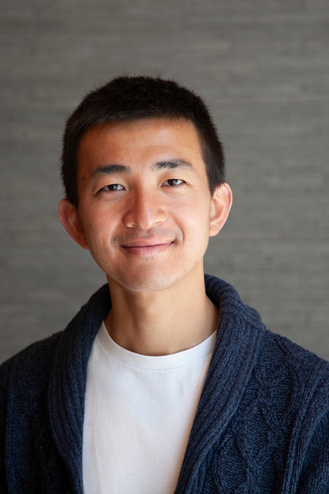Building Drugs from Scratch
Ziyang Zhang, a 2022 Rose Hills Innovator, uses his synthetic chemistry background to design new small molecules to treat autoimmune disease and cancer.

Ziyang Zhang, an assistant professor of chemistry and chemical biology, likes to tinker with molecules, creating chemical compounds never before seen in nature. The resulting compounds are finely tuned, precisely designed drugs. Zhang is using his background in synthetic chemistry to design drugs that can boost the power of the immune system to differentiate friend from foe— a task that has broad implications for treating both cancer and autoimmune disease.
“My basic approach is to use chemistry principles to design new therapies for human disease,” says Zhang. “I love the idea of creating something new, something that may have never existed before and can impact medicine.”
In 2022, Zhang was selected as Rose Hills Innovator. With that funding, his lab group is making molecules to treat autoimmune diseases like ankylosing spondylitis, which causes inflammation, pain and stiffness of the spine. By creating a specific, targeted molecule to block the immune reaction causing ankylosing spondylitis, Zhang thinks he can create a treatment with fewer side effects than existing, broad-acting immunosuppressants.
“Coming into Berkeley as a new assistant professor, the Rose Hills support has been critical,” says Zhang. “A lot of my projects are completely new and it’s not feasible to get traditional funding without preliminary data. These funds are helping us start working on those first experiments.”
From Computers to Chemistry
Zhang grew up in East China with an engineer and a nurse for parents. He always wanted to be a scientist— the only problem was that he wasn’t sure what kind of scientist. At Peking University in Northern China, he set out to study computer science but took a class in synthetic chemistry.
“I was immediately drawn to chemistry, to making things that are new and useful,” says Zhang. “The possibilities seemed endless.”
After this realization, Zhang joined the Peking University research lab of chemists Zhen Yang and Yefeng Tang. Together, the team deciphered the chemical reactions to produce a molecule that had been isolated from marine sponges and showed some potential as a cancer drug. The experience whetted his appetite for designing compounds with medical applications, and he decided to pursue a PhD in organic chemistry at Harvard. There, he worked with chemist Andrew Myers, designing new antibiotics.
“In his lab, we took the best of nature and the best of human creativity and made completely new things,” says Zhang.
Zhang’s work helped produce more than 800 new molecules, some of which could kill bacteria that were resistant to existing antibiotics. That work led to a startup company, Macrolide Pharmaceuticals, now a part of Eloxx Pharmaceutics, which is still pursuing commercial applications of the findings.
A Personal Connection
Zhang has close family with autoimmune disease and always hoped his research would lead him to study the human immune system. In a postdoctoral fellowship at UC San Francisco, he accomplished that: he worked with chemical biologist Kevan Shokat to develop new ways to leverage our immune system to target KRAS, a signaling protein that is mutated in nearly a quarter of all cancers.
At Berkeley, Zhang is continuing the same line of research. He wants to know how new chemical compounds can change the way the human immune system functions, to make it more effectively fight cancer and, alternatively, to prevent it from flaring up in autoimmune disease.
In ankylosing spondylitis, the immune system’s T cells attack healthy joint tissue. Today, the only treatments for the disease work by broadly shutting down the immune system with immunosuppressants, leading to side effects and making patients prone to infections.
Zhang thinks there’s a more targeted way to treat the disease— and he’s developing the drugs to do so.
More than 9 in 10 patients with the disease have a version of an immune molecule called HLA-B27; everyone has up to six different HLA molecules, which help signal T cells. Zhang is designing a molecule to block only HLA-B27, but not other HLAs. This could lead to a drug that can treat ankylosing spondylitis without shutting down the whole immune system.
Zhang used his computer science background to help analyze the structure of different HLA molecules and develop a plan for how a drug could differentiate HLA-B27 from the other versions. Then, he worked out chemical methods to produce such a drug from scratch. Now, with his Rose Hill funding, his team is studying the details of their potential drug, measuring exactly how, when and where it binds to HLA-B27.
“We want a molecular understanding of all these chemical interactions between molecules so we can optimize them and, eventually, treat disease,” he says.
The same approach— coupling a knowledge of the immune system with his skills at designing drugs from scratch— will help him treat other diseases in the future, Zhang hopes.
